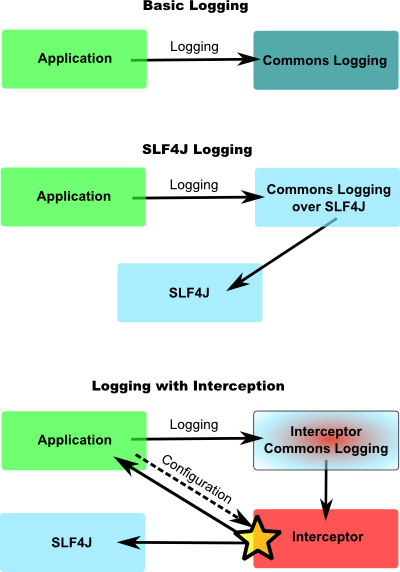Intercept log messages from Commons Logging, log4j, java.util.logging and SLF4J, and filter, duplicate or re-route them programmatically.
Logging frameworks are commonly used to provide asynchronous access to informational messages produced within code and within ancillary libraries. There are certain generalities found in the various logging frameworks, not least the ability to log messages written for one framework to a different framework at runtime. Yet the metaphor for output is that it is always written to an appender defined in a configuration file that says at what level to write and to where.
What has been difficult is to access logging messages within the message-producing application itself: When you are dealing with third-party libraries, being able to review their inner dialogue and reuse it elsewhere may be useful, and indeed that situation is the genesis for this project.
slf4j-interceptor builds off slf4j to allow log messages to be intercepted programmatically and decisions as to what to do with the messages to be made within your code. As an example, debug messages produced in a web application can be written as usual to a log file, but also be made available for display in administrative web pages in real-time. Add to this the ability to absorb and duplicate messages, or reroute them. This can be achieved against all logging frameworks supported by slf4j.
slf4j-interceptor works in the following modes:
- ABSORB - Messages are absorbed and do not go to the logger nor interceptor
- FILTER - Messages go only to the interceptor
- DUPLICATE - Messages go to both the logger and the interceptor
- PASSTHROUGH - Messages go only to the logger
slf4j-interceptor can be configured with a regex filter - only messages that hit the interceptor and match on the filter will be handed on.
slf4j-interceptor is deployed in two or more libraries. The main slf4j-interceptor library provides the programmatic interface to the interceptor system, message output and configuration, plus some utilities. The other libraries each mimic a logging framework expected by the code doing the logging for the interceptor. slf4j itself uses substitute logging libraries to funnel messages to slf4j core, and from there to its destination. slf4j-interceptor extends this slf4j approach to put a programmatic event interface between the log call and the slf4j core.
For example, to intercept Apache Commons Logging messages, the Commons Logging libraries would be removed from the classpath and replaced with slf4j-i-commons-logging. Adding a suitable slf4j output logging library would replicate the Commons Logging log appender functionality. By adding slf4j-i-intercepter provides programmatic access to the messages for your code.
Access to messages is provided statically by LoggerInterceptor. As a class static block, where messages are copied on to aStaticInterceptorStream:
{
/*
* Set the global log interceptor stream and have it filter what passes through.
*/
LoggerInterceptor.setInterceptOutputStream(aStaticInterceptorStream);
LoggerInterceptor.setInterceptorMode(Interceptor.Mode.FILTER);
}
Log messages then arrive on aStaticInterceptorStream to be process in the local code.
Looking at the obvious approach to intercepting logging messages by using a custom appender was hindered by a dearth of examples, and as thinking evolved, by the position of appenders at the end of the logging pipeline. By grabbing the messages as they were written, the vector was clearer (i.e. the Log interface) and it provides the ability to route the messages prior to any further processing by underlying Log frameworks.
How to intercept log calls without touching the code making those calls? Investigating AOP indicated a substantial opportunity for intractable issues given the dynamic nature of AOP and resulting problems debugging and reaching a consistent approach. Taking a lead from slf4j itself, log implementations can be replaced by facades that do the interception. While a facade is susceptible to brittleness as the underlying framework changes, it is more easily managed and debugged.
Given that slf4j has facades already in place, I decided to build of these to add log interception.
slf4j-interceptor - Copyright 2016 technosf [https://github.com/technosf]
Licensed under the Apache License, Version 2.0 (the "License"); you may not use this file except in compliance with the License. You may obtain a copy of the License at
http://www.apache.org/licenses/LICENSE-2.0
Unless required by applicable law or agreed to in writing, software distributed under the License is distributed on an "AS IS" BASIS, WITHOUT WARRANTIES OR CONDITIONS OF ANY KIND, either express or implied. See the License for the specific language governing permissions and limitations under the License.
